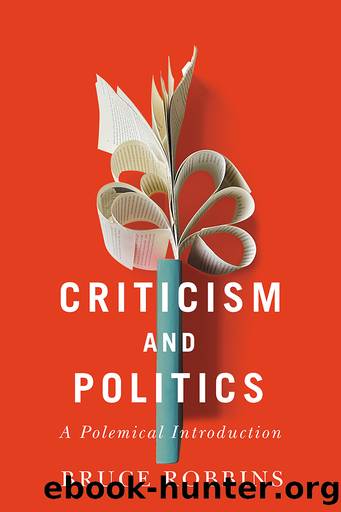Criticism and Politics by Robbins Bruce;

Author:Robbins, Bruce;
Language: eng
Format: epub
Publisher: Stanford University Press
Published: 2022-06-15T00:00:00+00:00
One prime site of ambivalence is the concept of the organic intellectual. As applied to academics, who might not otherwise seem to deserve the honor of being called intellectuals at all, Gramsciâs term has suggested that in this instance the honor is in fact deserved. Itâs deserved because of the academicâs bonds with a constituency outside the academy. Such a constituency would have to be one of a multiethnic, multigender, and nonheteronormative collection of constituencies that (like the working class for Gramsci) are supposed to be in the process of overcoming entrenched hostility and fighting their way upward or inward. Because they are embattled, they could theoretically be helped in their struggle by the cultural work of those who emerged from or attached themselves to those constituencies. The suggestion is by no means self-evident. In âRomancing the Organic Intellectual,â Aimee Carrillo Rowe hesitates to affirm it, and the reason she gives is the confusion that comes of inhabiting multiple identities. She describes herself as a âmiddle-class Chicana; indigenous-identified Xicana; queer, single mother, living in a multigenerational home; teacher, student, scholar; post-structuralist U.S. third world feminist.â10 Her relation to the concept of the organic intellectual has therefore been a âromance,â but a âvexedâ romance.â11
While Gramsci productively signals the ideological force our âconnectionâ to home communities exerts over knowledge production, his account doesnât provide an intersectional lens to untangle how multiple, cross-cutting connectivities become vexed through our labor as intellectuals. On the one hand, academics who seek to hold themselves accountable to colonized and marginalized groups often find themselves . . . inhabiting âalien (if not hostile) territory.â Not only do our radical (be)longings become vexed vis-Ã -vis the academy, but the production of our labor as intellectuals may also alienate us from home communities: rising class status, assimilation, and institutionalization often strain those ties. The organic intellectual is forged not only through belonging to a social class but also through the thick-hot-molten forceâthe push-pull, in-out, here-there danceâof a radical in-betweenness that arises through our affective ties to multiple and often contradictory sites of power.12
A similar set of reservations leads Hortense Spillers, writing in response to invocations of the organic intellectual by Cornel West, to break up with âorganicityâ once and for all.13 In a classic essay, Spillers sets herself the task of comparing the situation of African Americans in the mid-90s with their situation in the mid-60s, when Harold Cruse was writing his Crisis of the Negro Intellectual. What has happened since then? She begins: âAlthough African American intellectuals as a class have gained greater access to organs of public opinion and dissemination . . .â There follows a sequence of more âalthoughâ clauses (âalthough we can boast today a considerably larger black middle and upper-middle classâ). The sequence goes on; and by allowing it to go on, Spillers almost seems to be indulging the idea that there has in fact been significant progress since the 60s. But her list of middle-class Black achievements since the 60s, inside the academy and out,
Download
This site does not store any files on its server. We only index and link to content provided by other sites. Please contact the content providers to delete copyright contents if any and email us, we'll remove relevant links or contents immediately.
4 3 2 1: A Novel by Paul Auster(11788)
The handmaid's tale by Margaret Atwood(7447)
Giovanni's Room by James Baldwin(6808)
Asking the Right Questions: A Guide to Critical Thinking by M. Neil Browne & Stuart M. Keeley(5355)
Big Magic: Creative Living Beyond Fear by Elizabeth Gilbert(5351)
Ego Is the Enemy by Ryan Holiday(4956)
On Writing A Memoir of the Craft by Stephen King(4662)
The Body: A Guide for Occupants by Bill Bryson(4583)
Ken Follett - World without end by Ken Follett(4443)
Bluets by Maggie Nelson(4261)
Adulting by Kelly Williams Brown(4232)
Eat That Frog! by Brian Tracy(4149)
Guilty Pleasures by Laurell K Hamilton(4116)
White Noise - A Novel by Don DeLillo(3829)
The Poetry of Pablo Neruda by Pablo Neruda(3815)
Fingerprints of the Gods by Graham Hancock(3738)
Alive: The Story of the Andes Survivors by Piers Paul Read(3730)
The Book of Joy by Dalai Lama(3697)
The Bookshop by Penelope Fitzgerald(3619)
